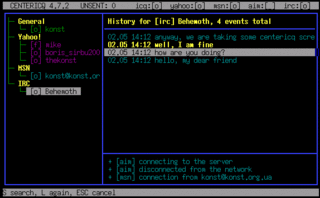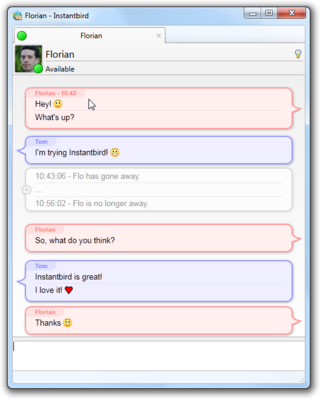ICQ New was a cross-platform instant messaging (IM) and VoIP client. The name ICQ derives from the English phrase "I Seek You". Originally developed by the Israeli company Mirabilis in 1996, the client was bought by AOL in 1998, and then by Mail.Ru Group in 2010.

Instant messaging (IM) technology is a type of online chat allowing immediate transmission of messages over the Internet or another computer network. Messages are typically transmitted between two or more parties, when each user inputs text and triggers a transmission to the recipient(s), who are all connected on a common network. It differs from email in that conversations over instant messaging happen in real-time. Most modern IM applications use push technology and also add other features such as emojis, file transfer, chatbots, voice over IP, or video chat capabilities.
Trillian is a proprietary multiprotocol instant messaging application created by Cerulean Studios. It is currently available for Microsoft Windows, Mac OS X, Linux, Android, iOS, BlackBerry OS, and the Web. It can connect to multiple IM services, such as AIM, Bonjour, Facebook Messenger, Google Talk (Hangouts), IRC, XMPP (Jabber), VZ, and Yahoo! Messenger networks; as well as social networking sites, such as Facebook, Foursquare, LinkedIn, and Twitter; and email services, such as POP3 and IMAP.

Pidgin is a free and open-source multi-platform instant messaging client, based on a library named libpurple that has support for many instant messaging protocols, allowing the user to simultaneously log in to various services from a single application, with a single interface for both popular and obsolete protocols, thus avoiding the hassle of having to deal with new software for each device and protocol.

Extensible Messaging and Presence Protocol is an open communication protocol designed for instant messaging (IM), presence information, and contact list maintenance. Based on XML, it enables the near-real-time exchange of structured data between two or more network entities. Designed to be extensible, the protocol offers a multitude of applications beyond traditional IM in the broader realm of message-oriented middleware, including signalling for VoIP, video, file transfer, gaming and other uses.

Kopete is a multi-protocol, free software instant messaging client released as part of the KDE Software Compilation. Although it can run in numerous environments, it was designed for and integrates with the KDE Plasma Workspaces. Kopete was started because ICQ blocked Licq from their network in 2001. According to the original author, Duncan Mac-Vicar Prett, the name comes from the Chilean Spanish word copete, meaning "a drink with your friends". Kopete has been nominated for multiple awards. The designated successor is KDE Telepathy from the KDE RTCC Initiative.

Miranda NG is an open-source multiprotocol instant messaging application, designed for Microsoft Windows. Miranda NG is free software distributed under the GNU GPL-2.0-or-later.

Adium is a free and open-source instant messaging client for macOS that supports multiple IM networks, including XMPP (Jabber), IRC and more. In the past, it has also supported AIM, ICQ, Windows Live Messenger and Yahoo! Messenger. Adium is written using macOS's Cocoa API, and it is released under the GNU GPL-2.0-or-later and many other licenses for components that are distributed with Adium.

Centericq is a text mode menu- and window-driven instant messaging interface that supports the ICQ, Yahoo!, AIM, MSN, IRC, XMPP, LiveJournal, and Gadu-Gadu protocols.
The TOC protocol, or Talk to OSCAR protocol, was a protocol used by some third-party AOL Instant Messenger clients and several clients that AOL produced itself. Sometime near August 19, 2005, AOL discontinued support for the protocol and no longer uses it in any of the instant messaging clients it actively maintains, such as its Windows and Mac clients for the AOL Instant Messenger and ICQ systems. However, it once did produce several of its own TOC clients, including TiK and TAC which are written in Tcl/Tk, TNT which is written in Emacs Lisp, all of which are open source, and a Java client originally called TIC which later became the Quick Buddy web applet. AOL also provided the TOC protocol specification openly to developers in the hopes that they will use it instead of the proprietary OSCAR protocol they use themselves. In July 2012, AOL turned off the TOC2 servers and it is no longer possible to connect to AIM using this protocol.

Psi is a free instant messaging client for the XMPP protocol which uses the Qt toolkit. It runs on Linux, Windows, macOS and OS/2.
Off-the-record Messaging (OTR) is a cryptographic protocol that provides encryption for instant messaging conversations. OTR uses a combination of AES symmetric-key algorithm with 128 bits key length, the Diffie–Hellman key exchange with 1536 bits group size, and the SHA-1 hash function. In addition to authentication and encryption, OTR provides forward secrecy and malleable encryption.

Skype for Business Server is real-time communications server software that provides the infrastructure for enterprise instant messaging, presence, VoIP, ad hoc and structured conferences and PSTN connectivity through a third-party gateway or SIP trunk. These features are available within an organization, between organizations and with external users on the public internet or standard phones.

Empathy was an instant messaging (IM) and voice over IP (VoIP) client which supported text, voice, video, file transfers, and inter-application communication over various IM communication protocols.

K Desktop Environment 3 is the third series of releases of the K Desktop Environment. It was one of the two major desktop environments for GNU/Linux systems between 2002 and 2008. There are six major releases in this series. After the release of KDE 4, version 3.5 was forked into the Trinity Desktop Environment.

QIP was a multiprotocol instant messaging client. It was a closed source freeware program originally developed by Ilgam Zyulkorneev. In 2008 it was bought by RosBusinessConsulting media group and named most popular RBC service in 2009.

Ayttm is a multi-protocol instant messaging client. It is the heir of the EveryBuddy project.

Instantbird is a discontinued cross-platform instant messaging client based on Mozilla's XULRunner and the open-source library libpurple used in Pidgin. Instantbird is free software available under the GNU General Public License. Over 250 add-ons allow user customization of, and addition of, features. On October 18, 2017, Florian Quèze announced that "... we are stopping development of Instantbird as a standalone product."

Matrix is an open standard and communication protocol for real-time communication. It aims to make real-time communication work seamlessly between different service providers, in the way that standard Simple Mail Transfer Protocol email currently does for store-and-forward email service, by allowing users with accounts at one communications service provider to communicate with users of a different service provider via online chat, voice over IP, and videotelephony. It therefore serves a similar purpose to protocols like XMPP, but is not based on any existing communication protocol.

OMEMO is an extension to the Extensible Messaging and Presence Protocol (XMPP) for multi-client end-to-end encryption developed by Andreas Straub. According to Straub, OMEMO uses the Double Ratchet Algorithm "to provide multi-end to multi-end encryption, allowing messages to be synchronized securely across multiple clients, even if some of them are offline". The name "OMEMO" is a recursive acronym for "OMEMO Multi-End Message and Object Encryption". It is an open standard based on the Double Ratchet Algorithm and the Personal Eventing Protocol . OMEMO offers future and forward secrecy and deniability with message synchronization and offline delivery.















